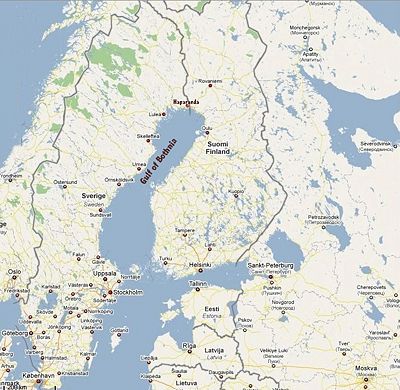Haparanda (city): Difference between revisions
imported>Paul Wormer No edit summary |
mNo edit summary |
||
| Line 5: | Line 5: | ||
Haparanda is a bilingual city, many of the inhabitants speak both Swedish and Finnish. | Haparanda is a bilingual city, many of the inhabitants speak both Swedish and Finnish. | ||
The Haparanda Archipelago National Park (Swedish: Haparanda skärgårds nationalpark), that opened in 1995, is in the Haparanda municipality. The park of 60 km² consists of many islands, just south of Haparanda in the Gulf. The islands have sandy beaches and extensive dune landscapes. The islands are low and have risen from the very shallow surrounding sea due to [[postglacial rebound]]. The park is noted for its interesting bird life. | The Haparanda Archipelago National Park (Swedish: Haparanda skärgårds nationalpark), that opened in 1995, is in the Haparanda municipality. The park of 60 km² consists of many islands, just south of Haparanda in the Gulf. The islands have sandy beaches and extensive dune landscapes. The islands are low and have risen from the very shallow surrounding sea due to [[postglacial rebound]]. The park is noted for its interesting bird life.[[Category:Suggestion Bot Tag]] | ||
Latest revision as of 16:00, 25 August 2024
Haparanda is a small Swedish city on the northern part of the Gulf of Bothnia in Norrbotten county. The city is on the border with Finland, adjacent to the Finnish city of Tornio (Torneå). Haparanda has a population of about 4800 inhabitants and an area of 3.97 km². The municipality Haparanda Stad (City of Haparanda) refers to the surrounding territory of 927 km² and has about 10,200 inhabitants.
Haparanda is a bilingual city, many of the inhabitants speak both Swedish and Finnish.
The Haparanda Archipelago National Park (Swedish: Haparanda skärgårds nationalpark), that opened in 1995, is in the Haparanda municipality. The park of 60 km² consists of many islands, just south of Haparanda in the Gulf. The islands have sandy beaches and extensive dune landscapes. The islands are low and have risen from the very shallow surrounding sea due to postglacial rebound. The park is noted for its interesting bird life.
